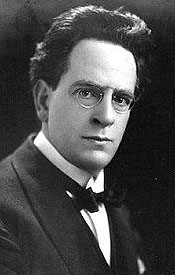Room 89--A Forgotten Genius

John Foulds (1880-1939) has been a forgotten British composer for many years but in the last ten years is experiencing a resurgence of interest in his music because it had a number of features that looked forward into the future. He was the son of a bassoonist in the Hallé Orchestra, and he eventually became a cellist in the same ensemble in 1900.
He composed both serious works and what the British call “light” music (which might be defined as rather light fluffy compositions with pleasing and memorable melodies). It was his light music which became popular and recordings of some of his pieces were being played by the BBC almost on a daily basis. This perturbed him to a degree, and he once complained to conductor Adrian Boult that his serious music was being ignored. At this time, he had only written about a dozen “light” pieces, but over 50 “serious” ones.
During World War I, he met and married a violinist named Maud Mc Carthy, who was one of the world’s experts on Indian music, which Foulds himself was quite interested in. He even wrote music for ensembles of their indigenous instruments. At the end of the War he composed a gigantic composition called A World Requiem which, after its completion in 1921, was performed each year in England on Armistice Day. The performance in 1923 was played by a huge ensemble of 1,250 performers. Its last performance (until 2007) was in 1926. It stopped being performed (some have conjectured) because it was felt that Foulds was an inappropriate composer for the occasion because he had not fought in the war.
In 1927 he and his family left for Paris, and in 1935, moved on to India, where he became the Director of European Music for All-India Radio in Delhi, created an orchestra from scratch, and began to work towards his dream of a musical synthesis of East and West.
He was asked to open a branch of the radio station, but within a week of arriving there, he contracted cholera and died.
His music is fascinating because he experimented with quarter tones (which we have already discussed here in Room 46). Here is an excerpt the second movement of his Dynamic Triptych for piano and orchestra, which was completed in 1929. You will note the use of quarter-tones in the string section of the orchestra. (It basically sounds like the music is running at the wrong speed.)
Listen!
Return to classroom second floor.
Return to classroom first floor..
If you need to leave, Go to initial page of site.
If you are interested in advertising a music-related business in the pages of the classroom, please send us an e-mail regarding rates by clicking here.
